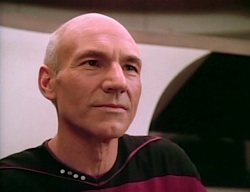Star Trek: The Next Generation First Season
Original air dates: September 1987 May 1988
Executive Producer: Gene Roddenberry
Co-Executive Producers (“Coming of Age” forward): Rick Berman & Maurice Hurley
Captain’s Log: Considered by many to be the least of The Next Generation‘s seven seasons, the first season frankly earned that particular reputation. The episodes were uneven, poorly plotted, ineptly scripted, and acted by actors who were still trying to figure their characters out.
To make matters worse, the show was wracked with behind-the-scenes drama. While Gene Roddenberry gets sole credit with creating the show, in truth TNG had many people involved in its creation and development, among them Robert H. Justman, D.C. Fontana, and David Gerrold, none of whom were still involved by the end of the first season. (Indeed, per Writer’s Guild regulations, Fontana, as the co-writer of “Encounter at Farpoint,” should have had equal co-creator credit with Roddenberry.) Roddenberry’s own failing health and his leaving much of the work of being showrunner and guardian of the Trek franchise to others—his assistant Susan Sackett, his lackey Richard Arnold, his lawyer Leonard Maizlish—led to a certain amount of chaos surrounding the production of the show that it’s sometimes amazing that the first season was as good as it was.
That turmoil also led to two departures. Denise Crosby would grow frustrated with the lack of development of her character (apparently not noticing how little everyone else got, too), and asked to be written out, which she was in “Skin of Evil.” After this season, Gates McFadden would depart the show due to differences with co-executive producer Maurice Hurley, though she, at least, would return after a year.
Adding to the drama, a writers strike hit at the very end of the season, forcing several episodes to air in draft form, leading to a weak ending for the season (“We’ll Always Have Paris,” “Conspiracy,” and “The Neutral Zone” all feel as if they could have benefitted from rewrites that never happened).
Anyhow, a look back at the rewatch of season one before we commence with season two’s premiere, “The Child,” on Thursday….
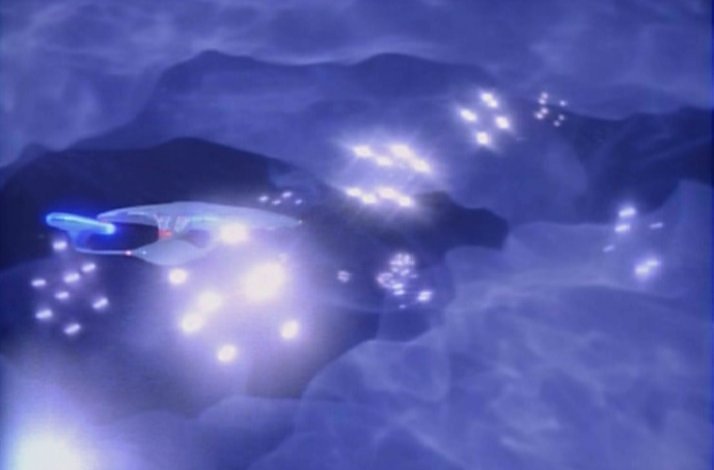
Highest-rated episode: “Where No One Has Gone Before,” with a warp factor of 8.
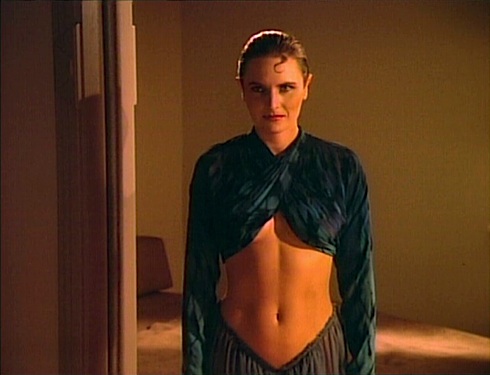
Lowest-rated episode: A tie among “The Naked Now,” “Code of Honor,” “Justice,” and “Angel One,” all with warp factors of 2. (Don’t worry, I will go as low as 1, but I’m saving that for really really special episodes….)
Most comments (as of this writing): “The Naked Now” with 36. “Coming of Age” is a close runner-up with 31.
Fewest comments (as of this writing): “We’ll Always Have Paris” with 8. Apparently nobody cares about Picard’s love life, as this is the only episode to still be in the single-digits as far as commenting goes.
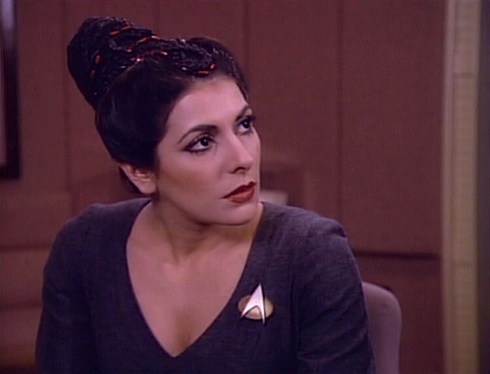
Favorite Thank You, Counselor Obvious: From “Coming of Age“: When Troi is being interrogated by Remmick, he asks if Picard suffered any mental lapses. Troi says no, and Remmick brings up the events of “The Battle.” When Troi points out that Picard was controlled by a mind-altering machine against his will, Remmick says, “I would call that a mental lapse.” Troi at that point stews in annoyance, as if she’s been defeated by Remmick’s verbal trickery. What Troi should have said in response was something like: “You can call it that all you want, but since I’m a trained therapist and have medical degrees in psychology and stuff, I think my definitions of a mental lapse are of more use than those of an IG [Inspector General] drone. Also: stop staring at my cleavage.”
Favorite Can’t We Just Reverse the Polarity? Also from “Coming of Age“: The first two options listed when Jake’s shuttlecraft breaks down are the tractor beam and the transporter, but said options are rejected because the shuttle is too far away. What a pity that they’re not in a space ship that is capable of locomotion under its own power and would therefore be able to cut the distance by moving closer to the shuttle .
Favorite What Happens On The Holodeck, Stays On The Holodeck: From “The Big Goodbye“: The first holodeck-gone-bad episode, which would become a cliché in due course. The notion that the holodeck could ever allow someone inside it to be hurt is distressing, and the apparent risk that simply shutting the holodeck off would kill the people inside it is ridiculous. Who built this thing, anyhow?
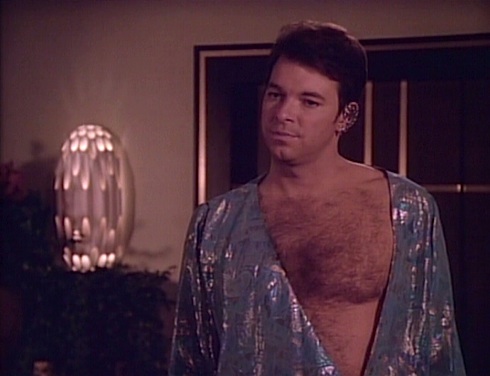
Favorite No Sex, Please, We’re Starfleet: From “Angel One“: Riker dresses like one of the locals, which involves tight pants and a shirt that reveals most of his chest hair. Dress like a rent boy, get treated like a rent boy—Mistress Beata immediately takes him to bed. I’m not sure, but I’m fairly certain that that’s an ethics violation .
Favorite The Boy!? From “Hide and Q“: Wes gets aged ten years, fulfilling his wildest dreams, and earlier in the episode he’s stabbed in the back, fulfilling the wildest dreams of the legions of Wesley-haters. Both, however, are reversed.
Favorite If I Only Had a Brain… From “Lonely Among Us“: Data first learns of Sherlock Holmes and starts emulating him—or, rather, emulating popular conception of Holmes since, at one point, he says, “it’s elementary, my dear Riker,” a turn of phrase that Holmes never actually used. Since Data is the most literal-minded person imaginable, he would never use this phrase based on his comprehensive study of Holmes. However, Data’s Holmes fetish becomes an entertaining recurring theme.
Favorite There is No Honor in Being Pummeled: From “Datalore“: Lore beats the crap out of Worf in the turbolift to show how tough he is. Why crying “emergency close” closes off all options isn’t made clear. (Why didn’t the security guards get the doors back open? Why didn’t Worf yell “emergency open”?) But hey, Lore must be tough, he can beat up the Klingon .
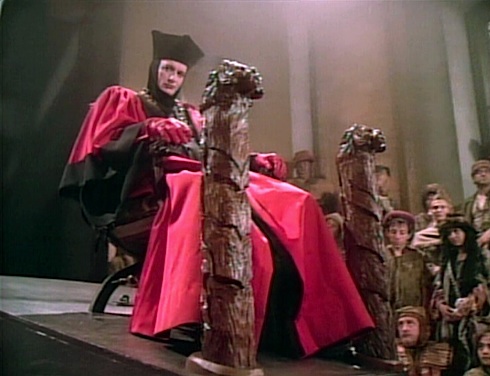
Favorite Welcome Aboard: Of the guest stars in season one, the best has to be John deLancie as Q, providing an iconic antagonist for the TNG crew in “Encounter at Farpoint” and “Hide and Q.”
Honorable mention must be made of the following: Vaughn Armstrong, who commenced his record-setting dozen guest characters with Korris in “Heart of Glory.” Marc Alaimo, who appeared as an Antican in “Lonely Among Us” and a Romulan in “The Netural Zone,” the first two of several guest turns on TNG before taking on the recurring role of Gul Dukat on Deep Space Nine. Colm Meaney, who appeared as a relief conn officer in “Encounter at Farpoint” and a security guard in “Lonely Among Us“—he would settle in as the transporter chief in season two, soon getting a name, and eventually going off to DS9 as well. Majel Barrett, who kicked off the overwhelming Lwaxana Troi in “Haven.” Brooke Bundy, Biff Yeager, Vyto Ruginis, and Walker Boone play four different chief engineers in five episodes, making it abundantly clear that they really needed to have a regular chief engineer (a problem that would be solved in season two).
Still, though, the high point for me remains seeing Robert Knepper in a mullet in “Haven.” T-Bag, what happened to you, man?
Favorite Trivial Matter: All the feeble excuses I contrived to mention my own Star Trek novels.
Make it So: It’s easy to forget now, because we’ve seen the subsequent six seasons, and also because we’ve seen a whole lot of good science fiction on television the past 25 years, but TNG was one of the few genre shows that even existed in the late 1980s. It was a groundbreaking show in more ways than one: besides paving the way for the genre shows that would come immediately after it (Alien Nation, Babylon 5, The Flash, Hercules: The Legendary Journeys, Highlander, Xena: Warrior Princess, etc.), it also created a new market. Prior to TNG, only game shows ran in first-run syndication. The show’s ratings success made it possible for other shows to follow that path to success (including some of the ones I just listed).
Yes, it had some stiff acting and some clunky scripts, but it also gave us a collection of characters whose popularity remains to this day, particularly Captain Jean-Luc Picard, not to mention Data and Worf (they are still truly the “big three” of TNG).
You gotta start somewhere.
Warp factor rating for the season: 5
Keith R.A. DeCandido was in college at Fordham University when TNG debuted, but his desire to write Star Trek fiction actually goes back to high school, when he first started reading them. So it was kind of a thrill to be hired in 1999 to both write a TNG comic book (Perchance to Dream) and a TNG novel (Diplomatic Implausibility, which was published in 2001). Go to his web site for info on ordering his most recent books (the genre-bending police procedurals Unicorn Precinct and SCPD: The Case of the Claw and his Dungeons & Dragons novel Dark Sun: Under the Crimson Sun), as well as links to his blog, Facebook, and Twitter, not to mention his twice-monthly podcast Dead Kitchen Radio, and the other podcasts he works on (The Chronic Rift and HG World).










